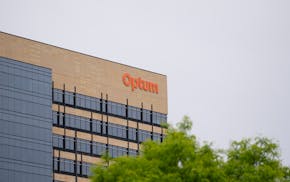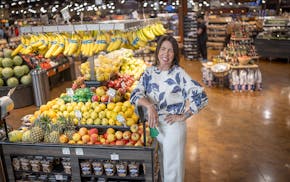Not so long ago, UNFI was looking to sell the dozens of Cub grocery stores it owns.
Now, "we're optimistic that Cub will be a strong player for years to come," UNFI Chief Executive Sandy Douglas told investors last month. "We have a new team in there that's building a new strategy, working closely with our franchisees."
Heading that team is Andre Persaud, who became CEO of retail at UNFI a year ago. His mission, in a word: relevance.
"Our goal is to ensure that we're on the leading side as consumer preferences change, and ensure that we stay relevant to them," Persaud said in an interview.
UNFI became Cub's owner when the Rhode Island-based wholesaler bought SuperValu in 2018 for $2.9 billion. After shedding other retail brands over the years, UNFI owns 54 Cub locations, mainly in the Twin Cities, and 22 Shoppers stores on the East Coast. Those stores had a combined $2.4 billion in revenue over the past year.
Franchisees own another 26 Cub stores.
Persaud, 56, is based in Chicago but is in the Twin Cities nearly every week. He came to UNFI with 30 years of retail experience, including leadership roles at Rite Aid and Walmart Canada.
Part of his mandate is ensuring the 55-year-old Cub brand evolves with the times — online ordering and hot meals are a must — while maintaining a reputation for reliability.
"We want to make sure we have the best associates possible, and we're doing everything we can to support our franchisees," Persaud said. "I'm excited about the journey. What does the next 55 years of Cub look like?"
The following interview was edited for length and clarity.
How has Cub navigated consumer sentiment around inflation?
Persaud: It's definitely top of mind for us every single day. And we think about this broadly.
The transactional piece is being competitive. Since I've joined the organization, we've improved our pricing position on items that really matter for customers. Those everyday items in everyone's household, we want to make sure that customers see we're offering a fair price. The second part there is Cub has historically done well when you look at our history on promotions.
And over the last three to four months, we've really done a nice job of becoming much more promotion-relevant for items that customers want. And that's working rather very well.
But managing inflation goes beyond just, you know, the transactional piece. We've launched a prepared meals program to ensure that moms and dads know they can come into Cub and get a full meal for their family, a nutritious meal, a lot cheaper than ordering at a restaurant or using one of those apps, and obviously a lot healthier.
Another component is our private brands like Essentials Everyday, Wild Harvest and Woodstock. We continue to add more offerings as those items become available. And just recently, for our customers who are eligible for SNAP benefits, they can now shop cub.com with that.
What are Cub's plans for its store count?
Persaud: We opened a brand new store in Rochester six months ago. That was an incremental store, it's a beautiful store. Our Burnsville South store was torn down, and we're rebuilding that store right now to open in late spring of next year.
I would say the store footprint is well-positioned in the Twin Cities. We think we're most convenient in many markets. So while we're not ruling out any incremental brick-and-mortar stores, the reality is we have the footprint we need today within the Twin Cities markets.
Second, we're continuing to double down on our digital presence and meeting that customer however they want to be met, whether it's delivery, whether it's click and collect. And how do we continue to expand that? And we do this in partnership with our franchisees to ensure their stores are well positioned for success across the Twin Cities at the same time, too.
How has Cub maintained its dominant market share in the Twin Cities?
Persaud: Cub's been here 55 years. And one of the things that always comes out when you talk to customers is Cub's reliability, and being that hometown grocer. This business has multiple generations of shoppers — we've kept that, I'm gonna call it that relevance.
The other part is, when you think about reliability, we're known for breadth of assortment. We're known for freshness. We do a lot of work in local communities and support local organizations. Recently I was honored to be part of the kickoff for the Salvation Army kettle bell season in downtown St Paul.
Reliability also means being able to shop when you want to shop brick and mortar. So a large part of our stores are open 24 hours. The rest are 5 a.m. to midnight. So we're trying to do our best to meet the needs of working Minnesotans. And across the board, you don't get that really anywhere else.
What's Cub doing differently than competitors when it comes to customer loyalty?
Persaud: Every industry report you read, every customer survey that you look at, and this is not Cub specific: You have to earn that loyalty every single time a customer chooses to engage with you. So our north star is, how do we be that first choice as Minnesotans think about putting food on the table?
It means that we have to have the best in-store and digital experience. It's making sure our products are in stock. It's fresh, convenience, ensuring that as the assortment changes in the view of the consumer, we stay relevant and current. We're ensuring that we're staffed at the appropriate times across the store to take care of our customers. We have our My Cub Rewards program, which is our loyalty program, and I would say that's a work in progress, to be re-imagined and more relevant for the future.
What other changes do you want to implement at Cub now that you've overseen the brand for a year?
Persaud: We want to appeal to all generation of Cub shoppers, and that means taking care of that legacy shopper but also understanding their kids' needs are different, and they engage with the brand differently.
This is really one of the unique things about the Twin Cities market — there's this really high emotional attachment to Cub from younger customers. So how do we ensure that we stay relevant? Whether it's wellness, whether it's digital, whether it's nutrition, how do we be that first choice as they think about putting food on the table? We have a strategy in place that we're working through to make that happen over the next 12 to 24 months.
We've invested a lot of energy and resources, since I've joined, to make our digital presence much more effective for our customers. And we're seeing our customers continue to engage with us a lot more digitally.

Judge approves $69M class action settlement in UnitedHealth 401(k) litigation

Is your employer on the 2025 list of Minnesota's Top Workplaces?
Edina's Southdale Center opens dedicated wing for luxury stores
